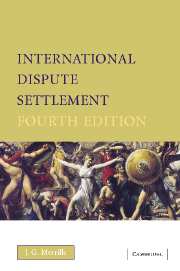Book contents
- Frontmatter
- Contents
- Preface
- Table of cases
- Table of treaties and agreements
- List of abbreviations
- List of websites
- 1 Negotiation
- 2 Mediation
- 3 Inquiry
- 4 Conciliation
- 5 Arbitration
- 6 The International Court I: Organisation and procedure
- 7 The International Court II: The work of the Court
- 8 The Law of the Sea Convention
- 9 International trade disputes
- 10 The United Nations
- 11 Regional organisations
- 12 Trends and prospects
- Appendices
- Index
2 - Mediation
- Frontmatter
- Contents
- Preface
- Table of cases
- Table of treaties and agreements
- List of abbreviations
- List of websites
- 1 Negotiation
- 2 Mediation
- 3 Inquiry
- 4 Conciliation
- 5 Arbitration
- 6 The International Court I: Organisation and procedure
- 7 The International Court II: The work of the Court
- 8 The Law of the Sea Convention
- 9 International trade disputes
- 10 The United Nations
- 11 Regional organisations
- 12 Trends and prospects
- Appendices
- Index
Summary
When the parties to an international dispute are unable to resolve it by negotiation, the intervention of a third party is a possible means of breaking the impasse and producing an acceptable solution. Such intervention can take a number of different forms. The third party may simply encourage the disputing states to resume negotiations, or do nothing more than provide them with an additional channel of communication. In these situations the intermediary is said to be contributing ‘good offices’. On the other hand, the assignment may be to investigate the dispute and to present the parties with a set of formal proposals for its solution. As we shall see in Chapter 4, this form of intervention is called ‘conciliation’. Between good offices and conciliation lies the form of third-party activity known as ‘mediation’.
Like good offices, mediation is essentially an adjunct of negotiation, but with the mediator as an active participant, authorised, and indeed expected, to advance fresh proposals and to interpret, as well as to transmit, each party's proposals to the other. What distinguishes this kind of assistance from conciliation is that a mediator generally offers proposals informally and on the basis of information supplied by the parties, rather than independent investigations, although in practice such distinctions tend to be blurred. In a given case it may therefore be difficult to draw the line between mediation and conciliation, or to say exactly when good offices ended and mediation began.
- Type
- Chapter
- Information
- International Dispute Settlement , pp. 28 - 44Publisher: Cambridge University PressPrint publication year: 2005



